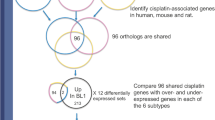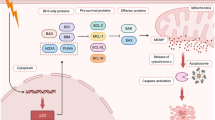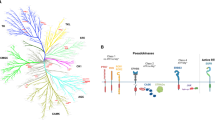Abstract
ABCG2 is a half-transporter initially described in multidrug-resistant cancer cells and lately identified as an important factor in the pharmacokinetics of its substrates. Q141K is by far the most intensively studied single nucleotide polymorphism of ABCG2 with potential clinical relevance. Here we used stably transfected HEK cells to study the Q141K polymorphism together with the deletion of amino acids 315–316, which were recently reported to coexist in two cancer cell lines (A549 and SK-OV-3). Functional studies confirmed our previous report that when normalized to surface expression, Q141K has impaired transport of mitoxantrone. This result was extended to include the ABCG2-specific substrate pheophorbide a. While we found no functional consequence of deleting amino acids 315 and 316, we did find that the deletion mutant is no longer recognized by the BXP-21 antibody. We conclude that amino acids 315 and 316 form part of the epitope for the BXP-21 antibody.




Similar content being viewed by others
References
Dean M, Hamon Y, Chimini G (2001) The human ATP-binding cassette (ABC) transporter superfamily. J Lipid Res 42:1007–1017
Ozvegy C, Litman T, Szakacs G, Nagy Z, Bates S, Varadi A, Sarkadi B (2001) Functional characterization of the human multidrug transporter, ABCG2, expressed in insect cells. Biochem Biophys Res Commun 285:111–117. doi:10.1006/bbrc.2001.5130
Allikmets R, Schriml LM, Hutchinson A, Romano-Spica V, Dean M (1998) A human placenta-specific ATP-binding cassette gene (ABCP) on chromosome 4q22 that is involved in multidrug resistance. Cancer Res 58:5337–5339
Miyake K, Mickley L, Litman T, Zhan Z, Robey R, Cristensen B, Brangi M, Greenberger L, Dean M, Fojo T, Bates SE (1999) Molecular cloning of cDNAs which are highly overexpressed in mitoxantrone-resistant cells: demonstration of homology to ABC transport genes. Cancer Res 59:8–13
Chen ZS, Robey RW, Belinsky MG, Shchaveleva I, Ren XQ, Sugimoto Y, Ross DD, Bates SE, Kruh GD (2003) Transport of methotrexate, methotrexate polyglutamates, and 17beta-estradiol 17-(beta-D-glucuronide) by ABCG2: effects of acquired mutations at R482 on methotrexate transport. Cancer Res 63:4048–4054
Maliepaard M, van Gastelen MA, de Jong LA, Pluim D, van Waardenburg RC, Ruevekamp-Helmers MC, Floot BG, Schellens JH (1999) Overexpression of the BCRP/MXR/ABCP gene in a topotecan-selected ovarian tumor cell line. Cancer Res 59:4559–4563
Ozvegy-Laczka C, Hegedus T, Varady G, Ujhelly O, Schuetz JD, Varadi A, Keri G, Orfi L, Nemet K, Sarkadi B (2004) High-affinity interaction of tyrosine kinase inhibitors with the ABCG2 multidrug transporter. Mol Pharmacol 65:1485–1495. doi:10.1124/mol.65.6.1485
Robey RW, Medina-Perez WY, Nishiyama K, Lahusen T, Miyake K, Litman T, Senderowicz AM, Ross DD, Bates SE (2001) Overexpression of the ATP-binding cassette half-transporter, ABCG2 (MXR/BCRP/ABCP1), in flavopiridol-resistant human breast cancer cells. Clin Cancer Res 7:145–152
Doyle LA, Yang W, Abruzzo LV, Krogmann T, Gao Y, Rishi AK, Ross DD (1998) A multidrug resistance transporter from human MCF-7 breast cancer cells. Proc Natl Acad Sci USA 95:15665–15670. doi:10.1073/pnas.95.26.15665
Polgar O, Bates SE (2005) ABC transporters in the balance: is there a role in multidrug resistance? Biochem Soc Trans 33:241–245. doi:10.1042/BST0330241
Krishnamurthy P, Schuetz JD (2006) Role of abcg2/bcrp in biology and medicine. Annu Rev Pharmacol Toxicol 46:381–410. doi:10.1146/annurev.pharmtox.46.120604.141238
Hardwick LJ, Velamakanni S, van Veen HW (2007) The emerging pharmacotherapeutic significance of the breast cancer resistance protein (ABCG2). Br J Pharmacol 151:163–174. doi:10.1038/sj.bjp.0707218
Morisaki K, Robey RW, Ozvegy-Laczka C, Honjo Y, Polgar O, Steadman K, Sarkadi B, Bates SE (2005) Single nucleotide polymorphisms modify the transporter activity of ABCG2. Cancer Chemother Pharmacol 56:161–172. doi:10.1007/s00280-004-0931-x
Mizuarai S, Aozasa N, Kotani H (2004) Single nucleotide polymorphisms result in impaired membrane localization and reduced atpase activity in multidrug transporter ABCG2. Int J Cancer 109:238–246. doi:10.1002/ijc.11669
Kondo C, Suzuki H, Itoda M, Ozawa S, Sawada J, Kobayashi D, Ieiri I, Mine K, Ohtsubo K, Sugiyama Y (2004) Functional analysis of SNPs variants of BCRP/ABCG2. Pharm Res 21:1895–1903. doi:10.1023/B:PHAM.0000045245.21637.d4
Imai Y, Nakane M, Kage K, Tsukahara S, Ishikawa E, Tsuruo T, Miki Y, Sugimoto Y (2002) C421A polymorphism in the human breast cancer resistance protein gene is associated with low expression of Q141K protein and low-level drug resistance. Mol Cancer Ther 1:611–616
Tamura A, Wakabayashi K, Onishi Y, Takeda M, Ikegami Y, Sawada S, Tsuji M, Matsuda Y, Ishikawa T (2007) Re-evaluation and functional classification of non-synonymous single nucleotide polymorphisms of the human ATP-binding cassette transporter ABCG2. Cancer Sci 98:231–239. doi:10.1111/j.1349-7006.2006.00371.x
Li J, Cusatis G, Brahmer J, Sparreboom A, Robey RW, Bates SE, Hidalgo M, Baker SD (2007) Association of variant ABCG2 and the pharmacokinetics of epidermal growth factor receptor tyrosine kinase inhibitors in cancer patients. Cancer Biol Ther 6:432–438
Sparreboom A, Gelderblom H, Marsh S, Ahluwalia R, Obach R, Principe P, Twelves C, Verweij J, McLeod HL (2004) Diflomotecan pharmacokinetics in relation to ABCG2 421 C > A genotype. Clin Pharmacol Ther 76:38–44. doi:10.1016/j.clpt.2004.03.003
Sparreboom A, Loos WJ, Burger H, Sissung TM, Verweij J, Figg WD, Nooter K, Gelderblom H (2005) Effect of ABCG2 genotype on the oral bioavailability of topotecan. Cancer Biol Ther 4:650–658. doi:10.1158/1535-7163.MCT-04-0238
Cusatis G, Gregorc V, Li J, Spreafico A, Ingersoll RG, Verweij J, Ludovini V, Villa E, Hidalgo M, Sparreboom A, Baker SD (2006) Pharmacogenetics of ABCG2 and adverse reactions to gefitinib. J Natl Cancer Inst 98:1739–1742
Robey RW, Steadman K, Polgar O, Morisaki K, Blayney M, Mistry P, Bates SE (2004) Pheophorbide a is a specific probe for ABCG2 function and inhibition. Cancer Res 64:1242–1246. doi:10.1158/0008-5472.CAN-03-3298
Polgar O, Robey RW, Morisaki K, Dean M, Michejda C, Sauna ZE, Ambudkar SV, Tarasova N, Bates SE (2004) Mutational analysis of ABCG2: role of the GXXXG motif. Biochemistry 43:9448–9456. doi:10.1021/bi0497953
Litman T, Jensen U, Hansen A, Covitz K, Zhan Z, Fetsch P, Abati A, Hansen P, Horn T, Skovsgaard T, Bates S (2002) Use of peptide antibodies to probe for the mitoxantrone resistance-associated protein MXR/BCRP/ABCP/ABCG2. Biochim Biophys Acta 1565:6–16. doi:10.1016/S0005-2736(02)00492-3
Honjo Y, Hrycyna CA, Yan QW, Medina-Perez WY, Robey RW, van de Laar A, Litman T, Dean M, Bates SE (2001) Acquired mutations in the MXR/BCRP/ABCP gene alter substrate specificity in MXR/BCRP/ABCP-overexpressing cells. Cancer Res 61:6635–6639
Robey RW, Honjo Y, van de Laar A, Miyake K, Regis JT, Litman T, Bates SE (2001) A functional assay for detection of the mitoxantrone resistance protein, MXR (ABCG2). Biochim Biophys Acta 1512:171–182. doi:10.1016/S0005-2736(01)00308-X
Ozvegy-Laczka C, Varady G, Koblos G, Ujhelly O, Cervenak J, Schuetz JD, Sorrentino BP, Koomen GJ, Varadi A, Nemet K, Sarkadi B (2005) Function-dependent conformational changes of the ABCG2 multidrug transporter modify its interaction with a monoclonal antibody on the cell surface. J Biol Chem 280:4219–4227. doi:10.1074/jbc.M411338200
Robey RW, Honjo Y, Morisaki K, Nadjem TA, Runge S, Risbood M, Poruchynsky MS, Bates SE (2003) Mutations at amino acid 482 in the ABCG2 gene affect substrate and antagonist specificity. Br J Cancer 89:1971–1978. doi:10.1038/sj.bjc.6601370
Ozvegy C, Varadi A, Sarkadi B (2002) Characterization of drug transport, ATP hydrolysis and nucleotide trapping by the human ABCG2 multidrug transporter: modulation of substrate specificity by a point mutation. J Biol Chem 277:47980–47990. doi:10.1074/jbc.M207857200
Miwa M, Tsukahara S, Ishikawa E, Asada S, Imai Y, Sugimoto Y (2003) Single amino acid substitutions in the transmembrane domains of breast cancer resistance protein (BCRP) alter cross resistance patterns in transfectants. Int J Cancer 107:757–763. doi:10.1002/ijc.11484
Ejendal KF, Diop NK, Schweiger LC, Hrycyna CA (2006) The nature of amino acid 482 of human ABCG2 affects substrate transport and ATP hydrolysis but not substrate binding. Protein Sci 15:1597–1607. doi:10.1110/ps.051998406
Pozza A, Perez-Victoria JM, Sardo A, Ahmed-Belkacem A, Di Pietro A (2006) Purification of breast cancer resistance protein ABCG2 and role of arginine-482. Cell Mol Life Sci 63:1912–1922. doi:10.1007/s00018-006-6159-7
Li YF, Polgar O, Okada M, Esser L, Bates SE, Xia D (2007) Towards understanding the mechanism of action of the multidrug resistance-linked half-ABC transporter ABCG2: a molecular modeling study. J Mol Graph Model 25:837–851. doi:10.1016/j.jmgm.2006.08.005
Honjo Y, Morisaki K, Huff LM, Robey RW, Hung J, Dean M, Bates SE (2002) Single-nucleotide polymorphism (SNP) analysis in the ABC half-transporter ABCG2 (MXR/BCRP/ABCP1). Cancer Biol Ther 1:696–702
Acknowledgments
The authors would like to thank Elizabeth Finley for help with the flow cytometry experiments.
This research was supported by the Intramural Research Program of the NIH, National Cancer Institute, Center for Cancer Research.
Author information
Authors and Affiliations
Corresponding author
Rights and permissions
About this article
Cite this article
Polgar, O., Deeken, J.F., Ediriwickrema, L.S. et al. The 315–316 deletion determines the BXP-21 antibody epitope but has no effect on the function of wild type ABCG2 or the Q141K variant. Mol Cell Biochem 322, 63–71 (2009). https://doi.org/10.1007/s11010-008-9940-0
Received:
Accepted:
Published:
Issue Date:
DOI: https://doi.org/10.1007/s11010-008-9940-0




